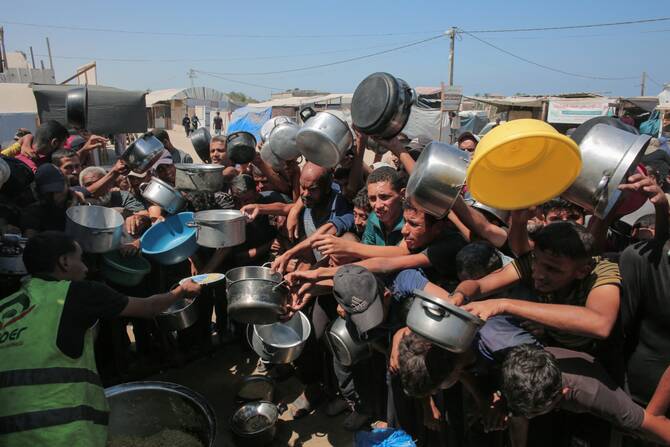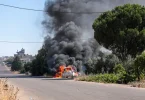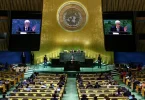Hani Hazaimeh
The unfolding famine in Gaza has been framed almost exclusively as a humanitarian catastrophe, a moral test for the international community and a devastating chapter in the long saga of Palestinian suffering. But to reduce it merely to a tragedy contained within Gaza’s besieged borders is to miss the broader picture. What Israel is enacting through deliberate starvation policies is not only a war crime under international law, but also the seed of a looming Arab security crisis. The reverberations of Gaza’s famine will extend far beyond its borders, threatening to destabilize Jordan, Egypt and the wider Arab world in ways that the region cannot afford to ignore.
For months, Israel has maintained an ironclad blockade, restricting food, water, medicine and other essentials from entering Gaza. This is not collateral damage or the byproduct of war, it is a calculated policy aimed at breaking the will of a civilian population. Children are malnourished, hospitals are collapsing and families are surviving on little more than animal feed. International aid convoys have been consistently blocked and humanitarian appeals repeatedly disregarded. This has created a famine in real time, visible to the world through harrowing images and testimonies. But what Israel sees as a tool to weaken Hamas has far wider implications, particularly for the stability of neighboring Arab states.
The most immediate risk lies in the potential for mass displacement. Gaza’s population of more than 2 million people has been effectively trapped within an open-air prison. If famine continues to deepen and if Israeli military operations expand, the likelihood of a forced mass exodus increases dramatically.
Egypt, already grappling with economic challenges, would face unbearable pressure should Palestinians be pushed toward the Sinai Peninsula. Jordan, with its own delicate demographic and political balance, cannot absorb another wave of refugees without inflaming tensions at home. The Arab world knows well from history that refugee crises do not remain temporary; they reshape the politics, security and stability of host countries for decades.
But the refugee threat is only one layer of the problem. Famine is a radicalizing force. A generation of young Palestinians growing up under starvation, siege and the complete absence of hope will not emerge as passive victims. They will carry the scars of hunger and humiliation into adulthood, fueling militancy and creating fertile ground for extremist ideologies.
For Arab states that have long sought to prevent the spread of radicalization within their borders, this is an uncontrollable wildfire waiting to spread. Israel’s actions may weaken Hamas in the short term, but they will almost certainly create a more fragmented, more desperate and more volatile set of actors within Palestinian society — actors whose rage will not be contained by Gaza’s walls.
Moreover, famine erodes the very idea of international order in the region. The Arab world has long relied, however uneasily, on international law, humanitarian conventions and multilateral institutions to protect Palestinian rights. Yet what Gaza demonstrates is that Israel can impose starvation with impunity, shielded by US vetoes at the UN and Western silence. This collapse of accountability sends a dangerous message: that brute force and collective punishment are permissible tools of statecraft.
If this precedent holds, what is to stop similar tactics from being used elsewhere? Arab states must recognize that the normalization of famine as a weapon sets a precedent that threatens their own security in future conflicts.
From a strategic perspective, Israel’s starvation policy is shortsighted even on its own terms. Starving Gaza into submission will not bring long-term peace or security for Israelis. Instead, it will destabilize the region, create new fronts of conflict and deepen Israel’s isolation. For Arab states, the danger lies not only in responding to the immediate humanitarian disaster but also in preparing for the ripple effects — waves of refugees, militant radicalization, political upheaval and the erosion of international norms.
The famine in Gaza is therefore not just a Palestinian tragedy, it is a mirror reflecting the vulnerabilities of the Arab world itself. It challenges Arab governments to confront a stark reality: that their security is inseparable from the fate of Palestinians. To view Gaza’s starvation as a contained crisis is to indulge in a dangerous illusion. In truth, it is a time bomb ticking at the heart of Arab security. The question is not whether the consequences will spill over but how quickly and how destructively they will do so.
The Arab response must go beyond charity and humanitarian aid. It requires a unified political stance that treats Gaza’s famine not only as a moral outrage but as a direct national security threat. Failure to act decisively will leave Arab states scrambling to manage the fallout of a crisis that could have been confronted at its root. History will not forgive hesitation in the face of starvation. Gaza’s famine is a deliberate act of war and its consequences will not stop at the Erez or Rafah crossings. They will reverberate through several Arab capitals and beyond. For the Arab world, the choice is stark: act now to confront this policy of starvation or face the unraveling of regional stability for years to come.
Courtesy: arabnews







